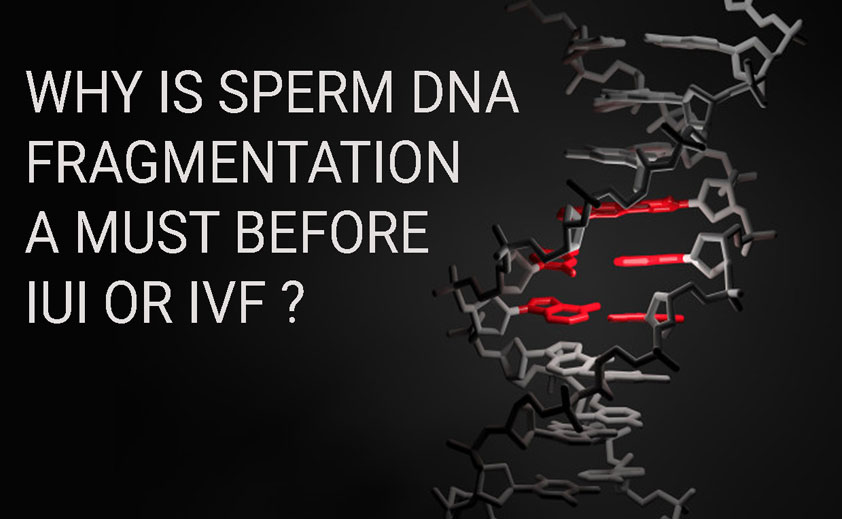

Why is Sperm DNA Fragmentation Tests for male partner necessary in IUI and IVF?
Why is sperm DNA Fragmentation Tests necessary?
The sperm is essential a carrier for genetic inheritance of the male partner constituting for 50% of the genetic makeup of the embryo. The genetic integrity of the spermatozoon is crucial for the healthy development of the embryo.
A semen analysis tests doesn’t give any indication of the sperm DNA damage. Although a normal semen analysis does not ensure a normal SDF level, men with poor semen parameters have higher probability of DNA fragmentation.
During Natural conception process, poor quality of sperms with DNA damage get naturally filtered out as the body as a system to prevent DNA damage sperms from fertilizing the egg. But in IUI or IVF treatment, where the fertilization happens inside a petri-dish, these natural barriers don’t exist. The chances of a sperm with DNA damage fertilizing the egg is same as that of a normal sperm. It is therefore even more important if you are undergoing IUI/ IVF treatment to go for a Sperm DNA fragmentation test.
What happens if an oocyte is fertilized with a Sperm with DNA damage?
Human oocyte has the ability to repair the DNA damage of the sperm to an extent that depends on the quality of sperm and oocyte which is inversely proportional to the paternal and maternal age. If a sperm with high degree of DNA damage were to fertilize an egg it would result in:
- Poor quality of under-developed embryos
- Abnormalities in embryos
- Higher chances of implantation failure
- Higher chances of miscarriage
- Higher likelihood of abnormalities in child
The etiology of sperm DNA damage is multifactorial.
The different factors that can contribute to sperm DNA damage include:
- Abnormal chromatin packaging, abortive apoptosis
- Varicocoele, genital tract infections(leucocytes)
- Immature sperms(cytoplasmic droplets)
- Laboratory factors, radio-and/or chemotherapy
- Lifestyle factors(obesity, age, cell phones and nicotine)
- Environmental toxicants
How is Sperm DNA damage occur?
The majority of DNA damage is associated with reactive oxygen species (ROS). These are free radicals created inside the cell as part of normal cellular physiology and are detoxified by the cell’s anti-oxidants defense machinery. ROS or free radicals are necessary is small levels for normal sperm function. Usually there is balance between the amount free radicals and anti-oxidants in a call. But the above mentioned factors can result in production of high levels of free radicals that cause an imbalance. This means there is more ROS in the sperm than the anti-oxidants can detoxify. The ROS is known to cause DNS damage by causing single and double stranded break in the Double helical structure of the DNA leading to higher levels of Sperm DNA fragmentation (SDF)
In 25% of infertile men, high ROS levels have been detected in their semen.
What does the test results indicate?
The Georgetown Male factor Infertility study established the statistical ranges for SDF which was classified as follows:
| Excellent | [DNA fragmentation < 15%] |
| Good | [DNA fragmentation > 15% to < 30%] |
| Fair to poor | [DNA fragmentation > 30%] |
With DFI < 27% the chances for pregnancy are significantly higher than patients with a DFI > 27%.
If > 30% sperms have abnormal chromatin: Fertility is hampered independent of sperm number, morphology and motility.
Achievement of Pregnancy:
- 84% of men with DFI of < 15% achieved a pregnancy during the first 3 months.
- 10% of men with a DFI < 30% achieved a pregnancy during months 4-12
- A DFI > 30% chance of success in different procedures is as follows:
- IUI patients: 7%
- IVF patients: 16%
- ICSI patients: 33% success is achieved
What are the recommended Treatment options for Men with Sperm DNA damage?
If DNA fragmentation index less than 30%, the recommended treatment is by IUI or IVF.
If DNA fragmentation index more than 30%, patient is advised to go for an ICSI procedure.
Using Testicular sperm extraction techniques to extract sperms for IVF fertilization is also a recommended option.
DNA damage occurs at the post-testicular level, so that testicular sperm is hypothesized to have a healthier DNA integrity than ejaculated sperm.
How to reduce sperm DNA damage?
It is possible to reduce and in some cases completely reverse the extent of sperm DNA damage. The recommended options would be:
- Treatment of ongoing infections
- Varicocoele repair.
- Changing the lifestyle (stop smoking, reduce obesity and exercise)
- Taking a diet rich in Anti-oxidants
- Taking Oral Anti-Oxidants.
Supplementing anti-oxidants for a duration of 2-3 months can help in improving the DFI only in case of single-strand breakage in the DNA.
To know more about Anti-Oxidant therapy, book a consultation with our fertility specialist at Care IVF.
Article Tags
About the author

Leave a Comment